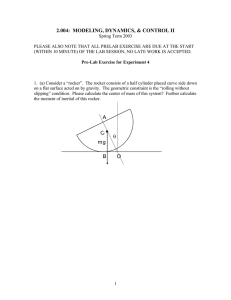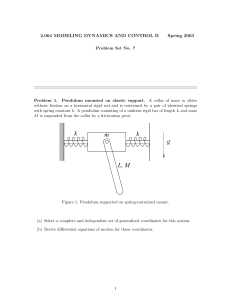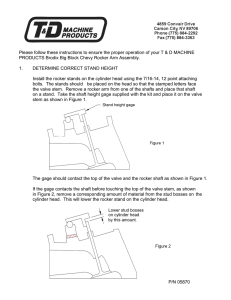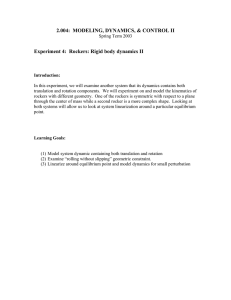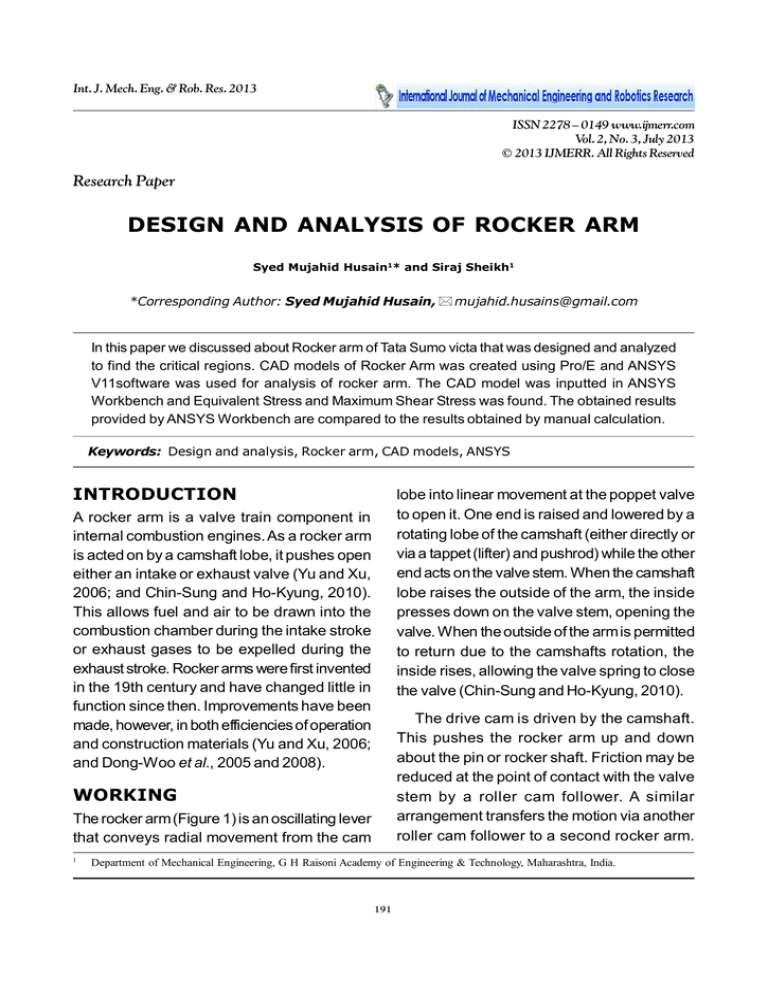
Int. J. Mech. Eng. & Rob. Res. 2013
Syed Mujahid Husain and Siraj Sheikh, 2013
ISSN 2278 – 0149 www.ijmerr.com
Vol. 2, No. 3, July 2013
© 2013 IJMERR. All Rights Reserved
Research Paper
DESIGN AND ANALYSIS OF ROCKER ARM
Syed Mujahid Husain1* and Siraj Sheikh1
*Corresponding Author: Syed Mujahid Husain, mujahid.husains@gmail.com
In this paper we discussed about Rocker arm of Tata Sumo victa that was designed and analyzed
to find the critical regions. CAD models of Rocker Arm was created using Pro/E and ANSYS
V11software was used for analysis of rocker arm. The CAD model was inputted in ANSYS
Workbench and Equivalent Stress and Maximum Shear Stress was found. The obtained results
provided by ANSYS Workbench are compared to the results obtained by manual calculation.
Keywords: Design and analysis, Rocker arm, CAD models, ANSYS
INTRODUCTION
lobe into linear movement at the poppet valve
to open it. One end is raised and lowered by a
rotating lobe of the camshaft (either directly or
via a tappet (lifter) and pushrod) while the other
end acts on the valve stem. When the camshaft
lobe raises the outside of the arm, the inside
presses down on the valve stem, opening the
valve. When the outside of the arm is permitted
to return due to the camshafts rotation, the
inside rises, allowing the valve spring to close
the valve (Chin-Sung and Ho-Kyung, 2010).
A rocker arm is a valve train component in
internal combustion engines. As a rocker arm
is acted on by a camshaft lobe, it pushes open
either an intake or exhaust valve (Yu and Xu,
2006; and Chin-Sung and Ho-Kyung, 2010).
This allows fuel and air to be drawn into the
combustion chamber during the intake stroke
or exhaust gases to be expelled during the
exhaust stroke. Rocker arms were first invented
in the 19th century and have changed little in
function since then. Improvements have been
made, however, in both efficiencies of operation
and construction materials (Yu and Xu, 2006;
and Dong-Woo et al., 2005 and 2008).
The drive cam is driven by the camshaft.
This pushes the rocker arm up and down
about the pin or rocker shaft. Friction may be
reduced at the point of contact with the valve
stem by a roller cam follower. A similar
arrangement transfers the motion via another
roller cam follower to a second rocker arm.
WORKING
The rocker arm (Figure 1) is an oscillating lever
that conveys radial movement from the cam
1
Department of Mechanical Engineering, G H Raisoni Academy of Engineering & Technology, Maharashtra, India.
191
Int. J. Mech. Eng. & Rob. Res. 2013
Syed Mujahid Husain and Siraj Sheikh, 2013
SPECIFICATION
Figure 1: Rocker Arm
The rocker use for our experimentation is of
Tata sumo victa which fails during it services.
Cracked rocker arms are occasionally
reported during routine inspections. The type,
power and other engine specification are
given in following Table 1. The material of
rocker arm is forged steel. Design
specification or design sheet of Rocker arm
is shown in Figure 3.
This rotates about the rocker shaft, and
transfers the motion via a tappet to the poppet
valve. In this case this opens the intake valve
to the cylinder head. The following figure
(Figure 2) shows the rocker arm in valve train
mechanism with cam at one end and valve
stem at the other end of rocker arm.
Table 1: Engine Specification
of Sumo Victa
Engine Specification
Type
Figure 2: Rocker Arm
Turbo-Charged, Water Cooled,
Direct Injection Diesel Engine
No. of Cylinders
4-inline
Bore/Stroke
97 mm x 100 mm
Capacity
2956 cc
Max. Engine Output
51.5 kw at 3000 rpm
Max. Torque
223 N-m at 1600-2200 rpm
Figure 3: Rocker Arm Design Specification
METHODOLOGY
Let,
mv = Mass of the valve,
dv = Diameter of the valve head,
192
Int. J. Mech. Eng. & Rob. Res. 2013
Syed Mujahid Husain and Siraj Sheikh, 2013
h = Lift of the valve,
w = 0.882 N
a = Acceleration of the valve,
Total load on the valve,
Pc = Cylinder pressure or back pressure,
P = P1 + w
= 502.4 + 0.882
Ps = Maximum suction pressure,
P = 503.282 N
d1 = is diameter of fulcrum pin,
• Initial spring force considering weight of the
valve,
D1 = is diameter of boss,
l = Length of arm,
Fs = /4 (dv)2 Ps – w
= angle between two arms.
= /4 x (40)2 x 0.02 – 0.882
We have,
Fs = 24.238 N
mv =.09 kg
• The force due to valve acceleration (Fa) may
be obtained as discussed below:
dv = 40 mm
h =13 mm
We know that speed of engine 3000 RPM
r = 13/2
The speed of camshaft = N/2
= 6.5 mm
= 3000/2
=.0065 m
= 1500 r.p.m
Pc = 0.4 N/mm2
and angle turned by the camshaft per
second
Ps = 0.02 N/mm2
d1 = 8 mm
= (1500/60) X 360
D1 = 18 mm
= 9000 deg/s
Time taken for the valve to open and
Speed of engine = 3000 RPM
close,
Angle of action of cam = 110°
t = Angle of action of cam
Calculating Forces Acting
Angle turned by camshaft
• We know that gas load on the valve,
= 110/9000
P1 = /4(dv)2 Pc
t = 0.012 s
= /4 x (40) x 0.4
2
We know that maximum acceleration of the
valve a = 2 · r
P1 = 502.4
Weight of associated parts with the valve,
= (2/t)2 · r
w=m·g
= (2/0.012)2 X 0.0065
a = 1780.2 m/s2
= 0.09 x 9.8
193
Int. J. Mech. Eng. & Rob. Res. 2013
Syed Mujahid Husain and Siraj Sheikh, 2013
Force due to valve acceleration,
d1
4
considering the weight of the valve,
Rf 2
Fa = m · a + w
where,
= 0.09 × 1780.2 + 0.882
d1 is diameter of fulcrum pin (d1 = 8 mm)
Fa = 161.1 N
1272.4 2
Now the maximum load on the rocker arm
for exhaust valve,
= 13.69 N/mm2
Fe = P + Fs + Fa
This shear stress is critical.
= 503.282 + 24.238 + 161.1
• Calculating bending stress of cross section.
Fe = 688.62 N
The Rocker arm may be treated as a simple
supported beam and loaded at the fulcrum
point. Therefore, due to the load on the valve
the rocker arm is subjected to bending
moment.
Since the length of the two arms of the
rocker are equal, therefore, the load at the
two ends of the arm are equal, i.e., Fe = Fc
= 688.62 N.
• We know that reaction at the fulcrum pin
Rf
F
2
e
8
4
We know that maximum bending moment
(M) of cross section,
Fc 2Fe Fc cos
2
D
M Fe l 1
2
Rf 688.22 688.22 2 688.2 688.2 cos176
Rf = 1376.43 N
18
688.62 27
2
Figure 4: Forces Acting on Rocker Arm
M =12387.96 N-mm
The rocker arm is of I-section
Section module Z,
Z
1 / 12 2.5t 6t 1.5t 4t
6t / 2
3
Where t is thickness
Z = 332.91 mm3
Bending stress,
Calculating Stresses
• Calculating shear stress at the pin
b
We have, load on the fulcrum pin Rf
194
M
Z
3
Int. J. Mech. Eng. & Rob. Res. 2013
Syed Mujahid Husain and Siraj Sheikh, 2013
M12387.96
332.91
Figure 7: Equivalent Stress
b = 37.2 N/mm2
This bending stress is near to critical limit
(i.e., 40/mm2).
ANALYTICAL RESULTS
With the given design specification in Figure
3 following CAD model of Rocker is prepared
on ProE. Figure 5 shows the CAD model of
Rocker arm of sumo victa.
Figure 8: Maximum Shear Stress
Figure 5: CAD Model of Rocker Arm
Reaction Force Acting at the Pin
Force Acting at the Exhaust Valve
End of Rocker Arm
First we will find the analytical results when
Reaction force (Rf =1376.43 N) is acting at
the fulcrum pin.
Now when maximum load (Fe = 688.62 N) is
acting on the rocker arm for exhaust valve arm
end.
Figure 6: Reaction Force Acting at the Pin
Figure 9: Force Acting at the Exhaust
Valve End of Rocker Arm
195
Int. J. Mech. Eng. & Rob. Res. 2013
Syed Mujahid Husain and Siraj Sheikh, 2013
Arm of a Diesel Engine”, Materials &
Design, Vol. 31, No. 2, pp. 940-945.
Figure 10: Equivalent Stress
2. Christer Spiegelberg and Soren
Andersson (2006), “Simulation of Friction
and Wear in the Contact Between the
Valve Bridge and Rocker Arm Pad in a
Cam Mechanism”, Machine Design,
Royal Institute of Technology, S-100 44
Stockholm, Sweden.
3. Dong-Woo Lee, Soo-Jin Lee, Seok-Swoo
Cho and Won-Sik Joo (2005), “Failure of
Rocker Arm Shaft for 4-Cylinder SOHC
Engine”, Engineering Failure Analysis,
Vol. 12, No. 3, pp. 405-412.
Figure 11: Maximum Shear Stress
4. Dong Woo Lee, Seok Swoo Cho and Won
Sik Joo (2008), “An Estimation of Failure
Stress Condition in Rocker Arm Shaft
Through FEA and Microscopic
Fractography”.
5. Giovanni Scire Mammano and Eugenio
Dragoni (2013), “Design and Testing of
an Enhanced Shape Memory Actuator
Elastically Compensated by a Bistable
Rocker Arm”, Structures Journal of
Intelligent Material Systems and
Structures.
CONCULSION
Rocker arm is an important component of
engine, failure of rocker arm makes engine
useless.
6. Hendriksma N, Kunz T and Greene C
(2007), “Design and Development of a
2-Step Rocker Arm”, SAE International,
USA.
The shear stress at the pin of a rocker arm
was evaluated by calculation as 13.69 N/mm2
and Ansys software it came ot to be nearly
12.76 N/mm2 this both values shear stress are
or critical shear stress. Thus we conclude that
pin of rocker arm is under shear stress.
7. James M Miller (1980), “Rocker Arm
Having Perpendicular Geometry at Valve
Mid Lift”, United States Patent Appl. No.
211, 638, December 1.
REFERENCES
8. Kano M and Tanimoto I (1991), “Wear
Resistance Properties of Ceramic
Rocker Arm Pads”, pp. 6-1, Materials
1. Chin-Sung Chung and Ho-Kyung Kim
(2010), “Safety Evaluation of the Rocker
196
Int. J. Mech. Eng. & Rob. Res. 2013
Syed Mujahid Husain and Siraj Sheikh, 2013
Development Department, Central
Engineering Laboratory, Nissan Motor
Co. Ltd., Daikoku-cho, TsumLmi-ku,
Yokohama-shi, Kanagawa 230, Japan.
Zamani (1991), “Design of Engine Cover
System Using FEA”, University of
Windsor.
12. W enjie Qin and Jie Shen (2009),
“Multibody System Dynamics Modelling
and Characteristic Prediction for One
Diesel’s Valve Train”, 2nd International
Conference on Information and
Computing Science.
9. Khurmi R S and Gupta J K (2011), “I.C
Engine Parts”, Machine Design,
pp. 584-589 and 1192-1195.
10. Kuznetsov B A and Tarasov V I (1965),
“Determining the Rate of Load Discharge
for a Loader with its Shovel on a Rocker
Arm”, Journal of Mining Science, Vol. 1,
No. 5, pp. 515-521.
13. Yu Z W and Xu X L (2006), “Failure
Analysis of Diesel Engine Rocker Arms”,
Engineering Failure Analysis, Vol. 13,
No. 4, pp. 598-605.
11. Lori Coon, Mohammad Esteghamatian,
David Fast, Daniel F Watt and Nader G
197

